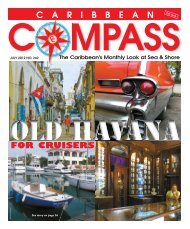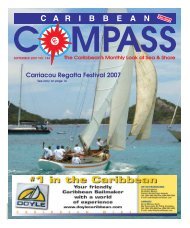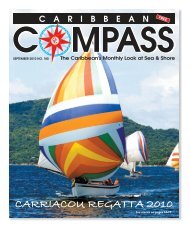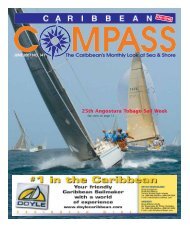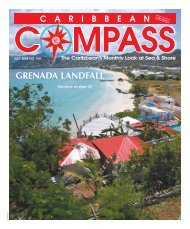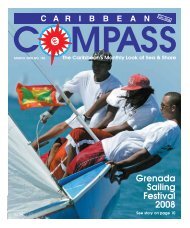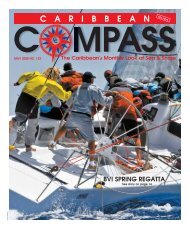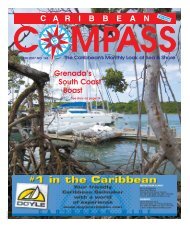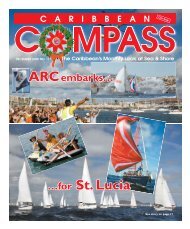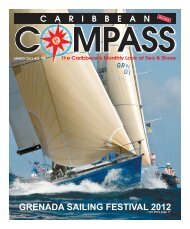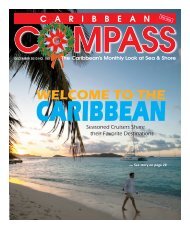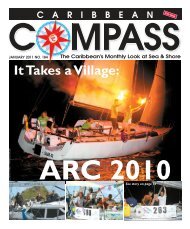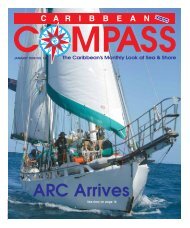Create successful ePaper yourself
Turn your PDF publications into a flip-book with our unique Google optimized e-Paper software.
BOOK REVIEW BY BOB BERLINGHOF<br />
Bewitched Doctor<br />
Out-Island Doctor, by Evans W. Cottman, with Wyatt Blassingame, Media<br />
Publishing, ©1963, reprinted in 1998. ISBN: 976-8170-17-4, paperback, 234 pages.<br />
Out-Island Doctor is the autobiography of Evans Cottman, a mild mannered, teetotaling<br />
high school science teacher who, as the story begins, lived with his parents<br />
in Indiana. What is extraordinary about Evans is that he yearned for something different,<br />
so he traveled to the Bahamas in the years preceding World War II and then<br />
decided to live there after his 20 years of teaching would earn him a pension. The<br />
story he tells is as enchanting today as the experience was to him back then, maybe<br />
more so; Evans found the Bahamas “strange and wonderful,” and he never lost that<br />
sense of amused bewilderment towards the locals and ex-pats he encountered.<br />
Early on we meet Percy Cavill,<br />
an impoverished Australian jackof-all-trades,<br />
living alone, who<br />
sails Evans to his remote island:<br />
We anchored and waded<br />
ashore carrying our supplies. A<br />
path wound up through a maze<br />
of scrubby bushes. At the top<br />
was a clearing with a pathetic<br />
little garden: some parched and<br />
worm-eaten cabbages, tomatoes,<br />
a few plants I didn’t recognize.<br />
Beyond the garden was a small<br />
yard littered with a fantastic collection<br />
of odds and ends: broken<br />
tree limbs and bits of firewood,<br />
parts of an ancient automobile<br />
motor, empty oil tins, a Dutch<br />
oven; a net hung from a nearby<br />
tree, a fish spear stuck upright in<br />
the ground. Near this a hole had<br />
been dug. It was evidently some<br />
kind of garbage pit for it was half<br />
filled by small, amazingly white,<br />
polished bones.<br />
Beyond this was his house. It<br />
was (I measured it later) exactly<br />
nine feet by twenty-one feet long.<br />
The walls were of clapboard, the<br />
roof thatched with palm fronds.<br />
Cavill pushed the sagging door<br />
open with his foot — and instantly<br />
a large black hen rushed out<br />
between his legs, followed by a saucy little Dominic rooster. “Come in,” Cavill said.<br />
“Drop your gear anywhere.”<br />
The inside was, if possible, more disorderly than the outside. The floor was of naked,<br />
hard-packed coral earth, with empty boxes and tin pans and tools of various sorts<br />
scattered everywhere. Against one wall was a table made of planks placed across two<br />
upended boxes. On it were more pans, unwashed dishes, an ancient kerosene lantern,<br />
and a lamp with a dirty chimney. Cavill’s bed was an ancient affair with a high iron<br />
headboard, the straw mattress only partially covered by a crumpled blanket.<br />
Underneath the bed was a hen’s nest. This was of straw, very carefully fashioned. It<br />
was, I think, the neatest thing in the room.<br />
Evans then meets Captain Rees, a retired British war hero, who sailed across the<br />
Atlantic in his 29-foot yacht. Cavill and Evans are invited for dinner aboard and<br />
happily accept:<br />
The food was bully beef out of a can, but the service was something else again. The<br />
Captain brought out a complete set of sterling silver, each piece bearing the Rees coat<br />
of arms, and set to work polishing it. Meanwhile he talked, mixing a wild collection of<br />
ancient British jokes with personal anecdotes about people he referred to only by their<br />
first names. It was a long time before I realized he was talking about various members<br />
of the British royal family.<br />
Pioneers like Cavill and Rees inspire Evans, who becomes a pioneer, husband, and<br />
father during the course of this book. In the early chapters he suffers from seasickness,<br />
hunger, thirst, sand flies and mosquitoes thick enough to choke on, yet he still<br />
returns to the Bahamas — he has become bewitched. Upon his parents’ death he<br />
moves to Crooked Island with his local bride, Viola Sawyer. In order to supplement his<br />
meager pension, he embarks on a career as an Unqualified Medical Practitioner. With<br />
doctors non-existent on most islands, people adept at science were allowed to treat<br />
patients with the blessing of the government — they even performed minor surgery.<br />
Evans took his new vocation seriously enough to overcome chronic seasickness,<br />
build a ketch, and sail himself to places where no white men had gone before. When<br />
people saw the boat with the green cross the word went out from village to village,<br />
“de doctuh come.” Usually someone would offer him a space ashore to sleep and<br />
practice; if not, he would row his patients out to his boat for treatment.<br />
Along the way he makes many friends and learns the local lingo: to “cascade”<br />
(vomit), and “de trash” (thrush), among other gems. He recounts many wonderful<br />
stories of his close encounters with both generous and sullen locals, nasty hurricanes,<br />
and dirty fuel clogging his motor’s filters time and again. Then there was the<br />
case of the woman who had beaten her husband so badly she wound up in jail. She<br />
wanted to sue the government when she fell through the floor of the jail’s outhouse.<br />
Evans‘ diagnosis was “temporary stinkitis and a punctured ego. Nothing serious.” The<br />
constable looked perplexed; the lady was swift to take advantage. “You hear what de<br />
doctah say? You hear all dem big disease I got!” “But dot ain’ seious,” the constable<br />
argued, “I heah de doctah say so myself.” …All the way down the path I could hear<br />
them arguing over the portents of my diagnosis. As they turned the corner out of sight<br />
I heard the lady cry, “Punctured! Dot’s what I is! I goin’ to sue…”<br />
This delightful tale takes the reader back to a time when ten acres of Bahamian<br />
land with 500 feet of beachfront cost 40 dollars, when many people couldn’t pass<br />
their eye examinations because they wouldn’t admit they didn’t know the alphabet,<br />
when no roads existed and the only means of travel was by foot or by boat. The<br />
Bahamas 60 years ago were mostly unchanged from the 19th century — a far cry<br />
from the marinas and internet cafes of the 21st. That the Bahamas can still retain<br />
this charm is why many ex-pats and sailors still flock here, and Cottman describes<br />
this era and its characters with wit, grace, humour, and lucidity.<br />
Available at bookstores in the Bahamas or from Amazon.com.<br />
Keep up the good work.<br />
The mag’s a good read that we<br />
send to our yacht club back home<br />
in Blighty!<br />
Regards,<br />
Ray and Irene McTear<br />
S/Y ‘C-Drifters’<br />
Join our growing list of on-line subscribers!<br />
12 issues US$29.95, 24 issues US$53.95<br />
See how to subscribe at:<br />
www.caribbeancompass.com<br />
MAY <strong>2009</strong> CARIBBEAN COMPASS PAGE 35




